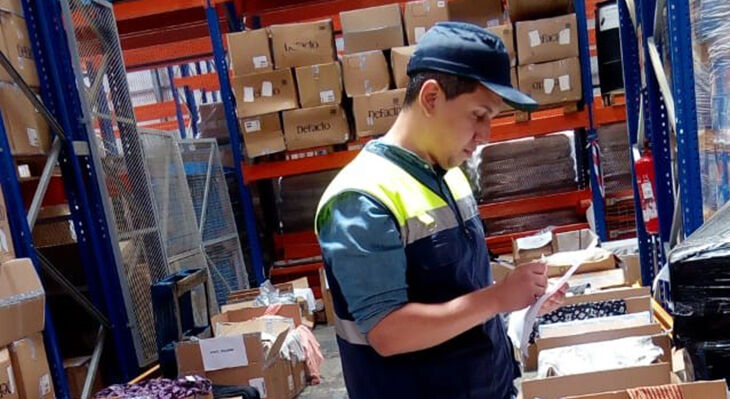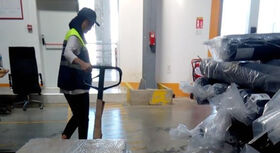Morocco: Training regulations as a framework for training close to the labour market
The virtual delegation visit of a group from Morocco was themed "Training regulations and how they are created". From 29 June to 1 July, experts from research and practice presented the development, implementation and evaluation of training occupations in Germany.

Despite positive economic developments in the country, Morocco is struggling with high youth unemployment. There are not enough jobs for young people, and at the same time, companies complain about a lack of qualified skilled workers. This is partly due to the vocational training system in Morocco, which is not sufficiently aligned with the requirements of the economy. Vocational training in Morocco currently takes place almost exclusively in vocational schools. Young people only gain practical experience through short internships in companies. With the "TAMHEEN" project, GIZ is supporting the implementation of the National Strategy for Vocational Education and Training 2021. The aim is to improve the quality of cooperative vocational education and training in Morocco by establishing a public-private dialogue. This is intended to strengthen the participation of the private sector in all areas of the VET system (development, implementation and evaluation).
In Germany's dual vocational training system, the private sector is involved in all processes and is actively involved in the development, implementation and evaluation of training regulations. GOVET, together with GIZ, therefore organised a three-day virtual delegation visit for representatives of the private sector as well as of state actors and vocational schools in Morocco. Under the motto "Training regulations and how they are created", GOVET invited experts from research and practice to share their experiences from Germany. The focus was on logistics professions, as these had recently been reorganised in Morocco and thus provided a good practical reference.
Expert input from Germany

The first day of the virtual delegation visit served to give the participants a first insight into dual VET in Germany. Peter Rechmann, Deputy Director of GOVET, presented the dual VET system and the various stakeholders in German VET. Afterwards, the participants were given insights into the logistics sector, both from the perspective of research, a company and a vocational school.
Dr. Anke Kock is responsible for logistics occupations at the Federal Institute for Vocational Education and Training (BIBB). Her work focuses on the organisation of initial and continuing training occupations in the transport and logistics sectors. In her presentation, Dr. Kock not only presented the different training occupations in the logistics sector, she also described the process of a reorganisation procedure involving the social partners.
Gabriele Schwarz, who is responsible for the training in the field of logistics at the company Wackler Spedition & Logistik, then explained to the participants how the training regulations are implemented within the company.
From the company as a place of learning, the journey continued directly at the school as a place of learning. Dr. Hannelore Kress, GOVET, had the opportunity to conduct an interview with Dr. Jutta Wittig, Head of Department at the Upper Secondary School for Logistics, Tourism and Taxes (OSZ Lotis), which was shown in the form of a video recording. Especially in times of Corona, vocational schools have to be extremely flexible with regard to the needs and educational level of the students and have to invest many volunteer hours in order not to lose anyone. Another challenge for vocational schools is that they have to keep up with the technological progress of the private sector.
In general, close cooperation between the two places of learning is important, not only for the successful implementation of the training regulations, but also for the individual success of the trainees. How can cooperation with companies, which can be completely different, succeed and how can framework curricula be adjusted to training regulations in the best possible way? Phillip Reiter and Carsten Kossack from the State Vocational School Centre Freising discussed this with Dr. Hannelore Kress on the second day of the delegation's visit.
Before this, BIBB expert Markus Bretschneider offered a detailed look at German training regulations and explained what content is laid down there. In particular, he also addressed reorganisation procedures, which take place in a much leaner form in Germany than in Morocco. BIBB provides support in the form of studies that are intended to cover as broadly as possible the in-company reality in the occupations to be reorganised.
On the third day of the delegation visit, the group dealt with the last step of a training - the examination. Andreas Bähre, head of the task creation institution ZPA Nord-West, presented the development and implementation of examinations, under the motto "Those who train, do not examine". He too stressed the importance of involving social partners in the whole process.
The participants from Morocco were also actively involved in the event. In working groups, they discussed current issues in Moroccan vocational education and training: Who is involved in the development of training in Morocco? Which actors still need to be involved? What competences are required for a finished skilled worker to meet the demands of the labour market? What barriers and challenges do the actors involved face on a day-to-day basis? In addition, the participants worked out a project plan in two groups for the introduction of a new dual logistics training and its financing. In a concluding discussion, it was once again emphasised that it is important to cover the needs of the labour market with the training regulations. The involvement of the private sector in the development, implementation and evaluation of occupations is of great importance, and so is the close cooperation between the two places of learning.